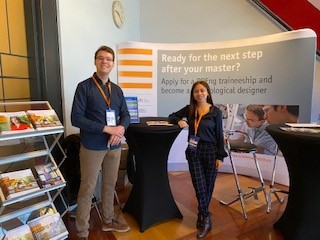Job Nijhuis did his bachelor and master degrees in Chemical Engineering at TU Eindhoven, with a focus on chemical process technology. “That’s kind of the die-hard side of chemical engineering. It covers designing distillation columns or reactors, for example. Primarily, you work on process equipment. I did my thesis on how you can approach chemical processes in space without the use of pumps. For instance, how can you make liquids flow in zero gravity?”
He completed his studies in December 2020, but he was keen to continue learning. “I was still interested in a number of subjects that I hadn’t had room for in my master, but I regarded a PhD as being too theoretical. On the TUe website, I noticed this process design programme that’s much more focused on applying your knowledge in practice.”
The EngD is a two-year programme. In his first year, Job studied around 30 different advanced subjects by focusing very intensively on one subject per week. “Some of those 30 subjects weren’t perfectly aligned with my interests, and you don’t become an expert in them, of course, but it was a good way to gain exposure to many different aspects of potential career opportunities. And thanks to all those subjects, I have a head start if I ever come into contact with them again in the future.”
Two-year programme
Now in his second year, he is working on a design project related to energy savings on behalf of a large company. “The project is a combination of saving energy in the short term by identifying the ‘low-hanging fruit’ on the one hand, and a research question on the other: how can this factory benefit from heat pumps? How can we design a circular energy network within the factory so that the facility could become gas-free, for example? I’m tasked with analyzing the water and energy flows in the factory and exploring how a heat pump could be integrated into the process. It’s not only super interesting but also useful, because it’s an urgent challenge. That’s precisely what you do during an EngD: tackle more complex issues and design solutions for them. It combines a creative challenge with technology, and that’s what makes it so enjoyable. Plus you’re working at the forefront of innovation. If you design something that works well, it might even become the new standard in 20 years time.”
“The EngD is a nice interim step. The university provides lots of theory, while at the company there’s a big chance that you’ll be working much more hands-on. So your EngD is a mix of theory and practice.”

Benefits
“In my view, an EngD offers various benefits. I’m expanding my knowledge in my chosen domain, which makes it easier to gain relevant work experience, and I still have lots of opportunities to do other things outside of my work. Besides being an ambassador for the EngD at TU/e, I’m also chair of Atmos which is the association for EngD trainees across all nine EngD tracks in Eindhoven. It’s not all hard work and no play. For example, Atmos organizes fun activities.”
“The personal guidance is another important aspect. In addition to the supervisor from within the company where I work, I also have twosupervisors at the university. One of them is focused on my project itself, and the other helps me to develop my skills in presenting, giving feedback and writing reports, for example. So you receive all kinds of support to prepare you for the next step, and I really appreciate that.”
“If you still want to continue working on your own development, if you’re keen to explore all the possible options, and if you’re not yet ready to commit to an employer, then an EngD is an ideal opportunity!



